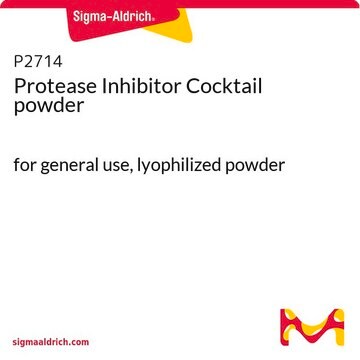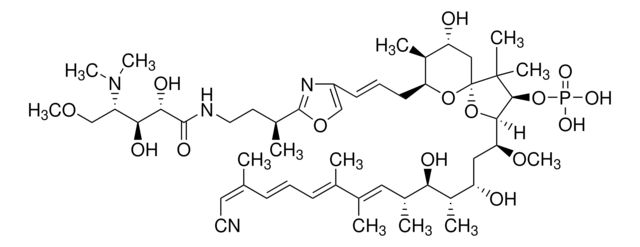O7760
Okadaic acid sodium salt from Prorocentrum concavum
≥90% (HPLC), film
Synonym(s):
OA
About This Item
Recommended Products
biological source
plant (Prorocentrum concavum)
Quality Level
Assay
≥90% (HPLC)
form
film
color
translucent
solubility
0.1% acetic acid in CH3CN: H2O (1:1): 250 μg/mL, clear, colorless
storage temp.
−20°C
SMILES string
[Na+].C[C@@H]1CC[C@]2(CCCCO2)O[C@@H]1[C@@H](C)C[C@H](O)[C@H]3O[C@@H]4CC[C@@]5(CC[C@@H](O5)\C=C\[C@@H](C)[C@@H]6CC(C)=C[C@@]7(O[C@@H](CC[C@H]7O)C[C@@](C)(O)C([O-])=O)O6)O[C@H]4[C@H](O)C3=C
InChI
1S/C44H68O13.Na/c1-25-21-34(55-44(23-25)35(46)12-11-31(54-44)24-41(6,50)40(48)49)26(2)9-10-30-14-18-43(53-30)19-15-33-39(57-43)36(47)29(5)38(52-33)32(45)22-28(4)37-27(3)13-17-42(56-37)16-7-8-20-51-42;/h9-10,23,26-28,30-39,45-47,50H,5,7-8,11-22,24H2,1-4,6H3,(H,48,49);/q;+1/p-1/b10-9+;/t26-,27-,28+,30+,31+,32+,33-,34+,35-,36-,37+,38+,39-,41-,42+,43-,44-;/m1./s1
InChI key
BYHIFOCTDVNQQT-GHIYGBLASA-M
Biochem/physiol Actions
Features and Benefits
Signal Word
Danger
Hazard Statements
Precautionary Statements
Hazard Classifications
Acute Tox. 3 Dermal - Acute Tox. 3 Inhalation - Acute Tox. 3 Oral - Skin Irrit. 2
Storage Class Code
6.1C - Combustible acute toxic Cat.3 / toxic compounds or compounds which causing chronic effects
WGK
WGK 3
Certificates of Analysis (COA)
Search for Certificates of Analysis (COA) by entering the products Lot/Batch Number. Lot and Batch Numbers can be found on a product’s label following the words ‘Lot’ or ‘Batch’.
Already Own This Product?
Find documentation for the products that you have recently purchased in the Document Library.
Customers Also Viewed
Our team of scientists has experience in all areas of research including Life Science, Material Science, Chemical Synthesis, Chromatography, Analytical and many others.
Contact Technical Service













